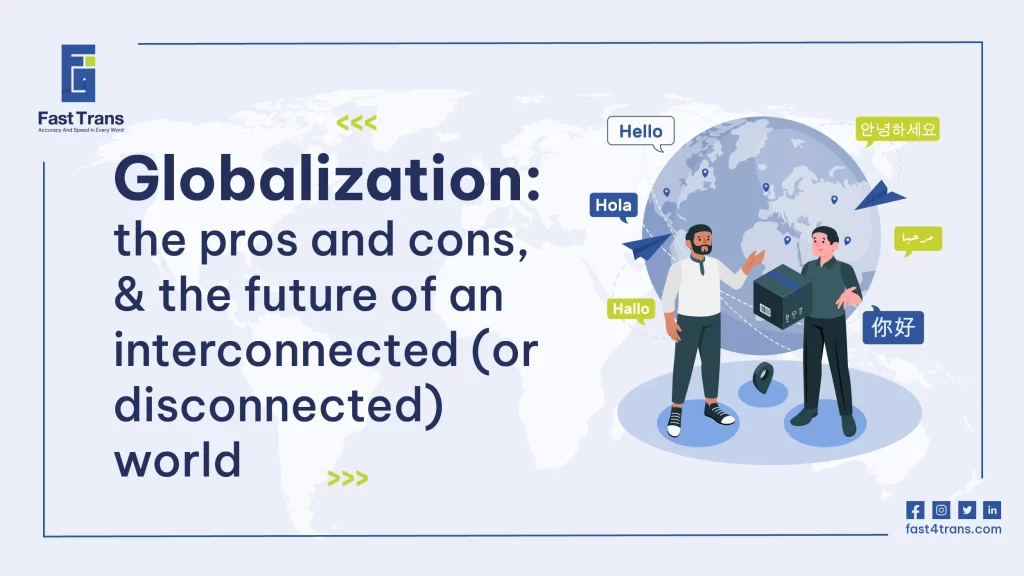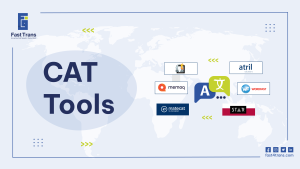Arabic globalization is the process of expanding brands and services across Arabic-speaking regions, uniting diverse markets with a shared cultural and linguistic foundation. It focuses on creating a consistent, broad-reaching presence that resonates throughout the Middle East and North Africa.
While it promotes regional cohesion and global exposure, it differs from localization, which tailors offerings to specific cultural nuances and local preferences. Globalization builds a unified identity, while localization ensures products and messaging connect deeply with the unique traditions and languages of each Arabic-speaking area.
What is Arabic globalization?
Arabic globalization refers to the spread of products, brands, businesses, and services across Arabic-speaking countries and regions, transcending national or linguistic borders within the Arab world. In short, it’s the process of expanding business specifically within Arabic-speaking markets on a regional scale.
According to Encyclopedia Britannica, Arabic globalization is the integration of economic, political, and cultural elements within the Arab world; it’s a concept that has evolved with the global movement of industries and ideas. Although the term “globalization” was originally coined by German American economist Theodore Levitt, it has become increasingly relevant in the context of the Arabic-speaking world.
Arabic globalization finds common cultural and linguistic elements across the Arab world in order to create an appealing customer experience that resonates with Arabic-speaking audiences, ensuring that products and services connect with local values and preferences.
The advantages of Arabic globalization
Arabic globalization boosts business growth by standardizing processes, accessing a large customer base, and expanding into new markets. It offers revenue potential, industry talent, and a competitive edge while reducing reliance on volatile economies.
1. Standardization of Process
Arabic globalization can lead to the standardization of certain processes, products, and cultural elements across different Arabic-speaking regions.
2. Manifesting a Huge Customer Base
Expanding into Arabic-speaking markets provides access to a vast and diverse customer base across the Middle East and North Africa (MENA) region.
3. Massive Exposure to International Markets
Arabic globalization offers the opportunity for massive exposure in global markets, making it easier for businesses to reach Arabic-speaking consumers worldwide.
4. Skyrocketing Potential for Revenue
Entering the Arabic-speaking markets can result in exponential revenue growth due to the high demand for products and services in the region.
5. Access to Plenty of Global Resources and Industry Talents
Arabic globalization opens up access to a broad range of resources, including skilled professionals and industry talents within the Arabic-speaking world.
6. Independence from a Risky Local Economy
By tapping into Arabic markets, businesses can reduce their dependence on local economies that might be volatile, thus diversifying their revenue streams.
7. Increased Competitive Advantage in the Market
Globalizing to Arabic-speaking regions enhances a company’s competitive advantage by positioning it as a key player in emerging markets.
8. An Exciting Competition with New Competitors
Arabic globalization brings the opportunity to engage in exciting competition with new local and regional competitors, driving innovation and growth.
Read more: What is Internationalization?
The disadvantages of Arabic globalization
Putting the business at risk of being insensitive or uncaring of cultural aspects specific to the Arabic world.
The risk of being too dependent on the global economy could suffer from disruption due to major events like wars or pandemics, which disproportionately affect regions in the Arab world.
Facing difficulty when entering completely foreign markets, for example, imagine a company from the West trying to expand into Arabic-speaking countries, such as Saudi Arabia or the UAE, where cultural differences and local regulations need careful attention.
But of course, there is no such thing as a universal experience all the way, since differences and diversity are inevitable among customers, especially in the context of the Arab world. Globalization eventually needs the help of localization to effectively cater to these unique needs.
The difference between Arabic localization and Arabic globalization
Now, we’ve come to the most important question. Let’s explore the primary differences between these two seemingly similar concepts, but in the context of Arabic markets.
Think of global companies that you interact with, such as Google, Apple, or Amazon. All of these brands have a global presence, and they maintain their core identity across various countries. However, it’s not just globalization that helps them reach Arabic-speaking audiences—localization plays a critical role here as well!
In this context, think of Arabic globalization as the broader goal or vision, and Arabic localization as the approach a company uses to align itself with the unique needs of Arabic-speaking regions.
Same Product, Slight Differences
A globalized product or service maintains the same core identity and values no matter where it’s marketed, but with Arabic markets, localization ensures that slight adjustments are made to meet regional preferences. For example, global brands like Burger King or Pizza Hut may have the same identity worldwide, but their menus, advertisements, and slogans are adapted and localized for different Arabic-speaking countries to reflect local tastes and culture.
Objective of Arabic Globalization versus Arabic Localization
Arabic globalization focuses on reaching a broad Arabic-speaking audience while promoting brand awareness, economic growth, and cross-cultural communication. It seeks to create a consistent brand identity that resonates across various Arabic-speaking regions.
On the other hand, Arabic localization focuses on tailoring the user experience to specific Arabic-speaking regions. This includes customizing content to suit local dialects, addressing cultural sensitivities, and ensuring that symbols and messaging are appropriate for each Arabic market. It also involves adapting marketing materials to align with local values and preferences, such as using local expressions and adjusting the tone to fit cultural norms.
Focus Points of Arabic Globalization and Arabic Localization
In the case of Arabic globalization, businesses emphasize broader factors such as market research, regional regulations, and global supply chains. They are concerned with ensuring their product reaches Arabic-speaking audiences across many countries in a unified way.
Meanwhile, Arabic localization dives deeper into understanding each Arabic-speaking culture. This includes awareness of local traditions, holidays, dialects, and even the political landscape. Successful Arabic localization requires a tailored approach that resonates with each specific community within the Arab world.
The Language Used in Arabic Globalization vs. Arabic Localization
The language of Arabic globalization remains fairly standardized, often using Modern Standard Arabic (MSA) to communicate with a wide audience across the Arab world. However, Arabic localization goes further by adapting the language to specific regions, using local dialects where appropriate. Localization ensures that while the essence of the brand message remains the same, it conveys the same emotional and linguistic impact in Arabic, whether it’s the Gulf, Levant, or North African Arabic.
Read more: Localization Glossary
Arabic Globalization VS Arabic Localization in a Nutshell
Globalization is the bird’s eye view. It’s the mindset that decides what you want your brand to be famous for. Let’s sum up these differences below by using keywords using the SGIA method, Scope, Goal, Impact, Approach:
| POC | Globalization | Localization |
| Scope | Broad, featuring interconnectedness of cultures | Narrow |
| Goal | Foster communication on a large scale between countries. | Provide a personalized and culturally tailored experience to a narrow customer base. |
| Impact | Promotes product and service standardization | Promotes diversity and respect for different markets. |
| Approach | Uniformal, standard, the customer knows what to expect. | Personalized, features slight differences, loyal to the local customer. |
| Example | Uber as a Car Ride service that is present in more than 10,000 cities around the globe, has the same identity everywhere. The mobile app design and its use are expected to be the same wherever customers use it. | However, the same globalized application Uber, uses localization. In Middle East countries, Uber customizes offers specifically for the Ramadan season. In 2017, Uber launched its UberBOAT, for Egyptian passengers who need a cruise across the Nile river. |
Fast Trans is your go-to company for presenting your business to other tongues
Are you a business that’s planning to expand to the Middle East and beyond?
Fast Trans prides itself as one of the leading translation and localization service providers in Egypt and the MENA region. Having a collaborative team of translators with years of experience in specialized fields, they are more than able to take care of your ambitious globalization plans and make it possible for your business. We provide a variety of top-tier localization services for Games, Websites, Software, Apps, and much more!
Whenever new clients trust Fast Trans with new translation projects, they are granted a free translation sample, a clear strategy of the project and its deadlines, while at the same time making a great decision by choosing the best quality in the market at a rock-bottom price!
Unlock your business ambitions with Fast Trans, it all starts here.
Conclusion
Arabic globalization involves the expansion of businesses, brands, and services across Arabic-speaking regions, focusing on the integration of economic, cultural, and political elements to connect with a broad audience. By leveraging common linguistic and cultural traits, businesses can effectively reach the diverse markets of the Middle East and North Africa (MENA), creating a unified experience that resonates across multiple countries. This approach helps brands increase their global presence and access vast customer bases, all while enhancing competitive advantages and revenue potential within the Arabic-speaking world.
While Arabic globalization focuses on reaching a large, diverse audience across various regions, it differs from Arabic localization, which tailors products and services to specific regional needs. Localization adapts content, language, and messaging to align with local dialects, customs, and preferences, ensuring a more personalized customer experience. The key distinction lies in the scope—globalization seeks to create a consistent brand identity, while localization ensures the product or service is culturally relevant and sensitive to the unique characteristics of each Arabic-speaking market.










